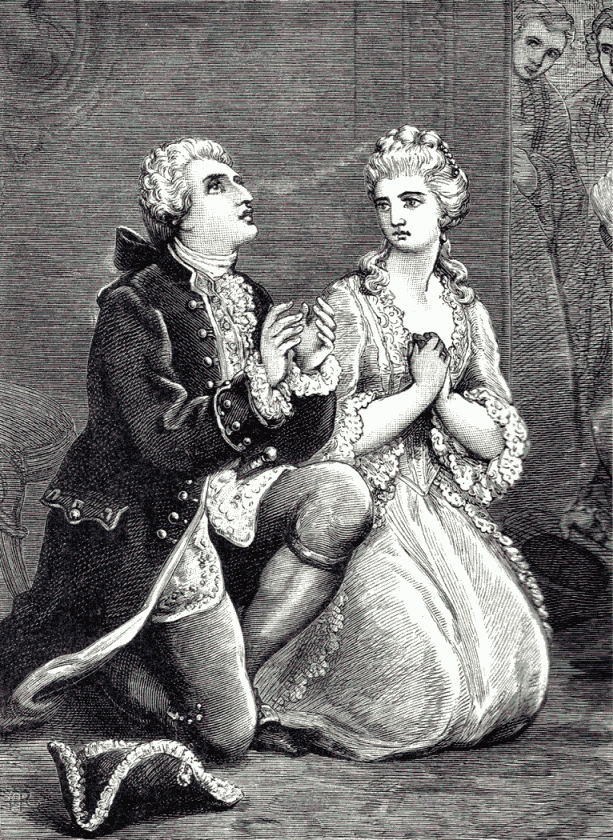Stories of the French Revolution - Walter Montgomery |
The Old King Dies
About eight miles from Paris is the town of Versailles, which was but a poor little village when a great king took a fancy to it and built there a palace. His son was passionately fond of state and grandeur, and he resolved to add to the palace, room after room and gallery after gallery, until he had made it the most superb house in all the world. It is said the cost was so frightful that he never let anyone know what the sum total amounted to, but threw the accounts into the fire. This was Louis XIV., called by Frenchmen "Le grand Monarque." He reigned seventy-two years, having been a mere child when called to the throne.
To this splendid palace and to an income of thirty millions a year, did his great-grandson, Louis XV., succeed. He, too, was a child of tender years when he entered on his vast inheritance. For a time the Duke of Orleans acted as regent; but when the little king was fourteen years of age he assumed the sceptre, and in two years more he married a Polish princess.
At one time Louis was very much beloved, and got the title of "Bien Aime;" but he afterward lost his people's affection, and by the time he died he was utterly despised, if not detested. Everything seemed to be going to rack and ruin. The French armies were defeated, their colonies fell into the hands of England, their navy suffered great losses, their commerce was all but ruined. Therefore the French people felt disgraced; and many of them believed all these evils were greatly owing to the idleness and bad management of their pleasure-loving and careless king.
At length, one year,—it was in the pleasant May-time,—Louis fell sick of smallpox. He was at once put to bed, and the doctors came to see him; but from the first they looked with grave anxiety on the ailing man. His three daughters—whom he had nicknamed Rag, Snip, and Pig—waited on him dutifully, though the terrible disease turned everybody sick who came near the bed. The stench was carried far into the palace; but there the princesses remained until the end came. They had a fourth sister, nicknamed Dud; but she was in a nunnery, and so could not wait upon her dying father.
So Louis, once the "Well Beloved," lay dying at last. Twice before he had been near death. Once at Metz he was very, very ill, and prayers ascended in every church for his recovery; and at another time he almost perished under the knife of an assassin, named Damiens, who leaped on the carriage-step and stabbed the king in the side. But now Death had come to him in earnest, and Louis was nevermore to smell the roses in the glorious gardens of Versailles; nor was he evermore to watch the wonderful fountains play, nor to hunt in the pleasant forest. Death had called for him at last, and he must go. When he felt himself sinking into the grave, he sent for the sacrament, and it was given him by Cardinal Roche Aymon. Many ministers of religion were praying incessantly in the chapel below for the king's recovery. While the dauphin (afterward Louis XVI.), his queen, and many of the courtiers were present at one of these services, the May skies were darkened by a sudden thunderstorm, and the rattling peals drowned the sound of the chants and prayers. The tempest rolled away, and soon after the old king breathed his last.
While he was in his death agonies, the dauphin and his wife and others were standing ready to leave Versailles at a moment's notice. The horses were yoked to the carriages, and the postilions in their churn-boots were standing by; all were ready for an instant start. At length the dauphin and Marie Antoinette heard a noise like the sound of distant thunder; it came nearer and nearer, and very soon the door of the apartment flew open, and all the courtiers crowded in, each wishing to outstrip the other in saluting the new majesties of France.
 THE YOUNG KING AND QUEEN FELL ON THEIR KNEES, AND ASKED GOD TO HELP THEM. |
The young couple, it is said, fell on their knees and asked God to help them to rule, for they were so young and knew not how. It was a pious deed; and we cannot but grieve as we see them, full of youth and hope and prosperity, beginning that course which so soon afterward ended in disaster and death.
It seems strange to us that Louis did not remain at Versailles and follow his grandfather to the grave. Wicked as he was, the old king might at least have had a decent funeral. As for the young king, he and his brilliant court did not remain an hour, but stepped into their carriages and were driven away at a rapid rate to Choisy. Meanwhile the dishonored body of the late monarch, now a mass of putrefying sores, was tumbled hastily into a coffin of lead, which was well supplied with spirits of wine. The coffin was then carried rapidly away by torchlight to St. Denis, where the kings of France had a burial-place. As the funeral procession passed through Paris, many were the bitter things said of him who was gone. The curious people stood in two rows to witness the dismal sight pass them at a quick trot.
Ten years of peace followed the accession of Louis XVI.; but he and his government had been meanwhile getting deeper and deeper into debt and discredit, and they were at length obliged, by sheer- want of money, to call together a parliament, called the States-General, which had not met for upward of a hundred and fifty years.